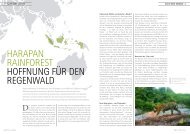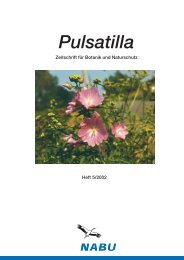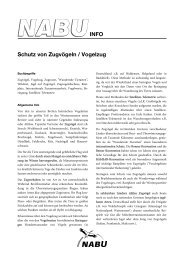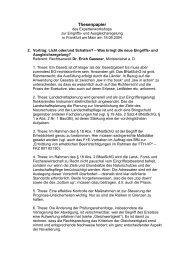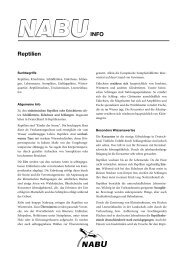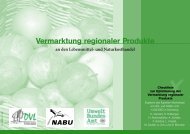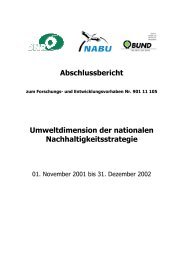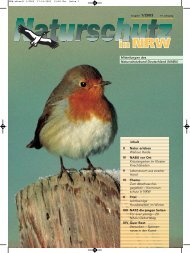Studie "The GMO-emperor has no clothes" (engl.) - Nabu
Studie "The GMO-emperor has no clothes" (engl.) - Nabu
Studie "The GMO-emperor has no clothes" (engl.) - Nabu
Create successful ePaper yourself
Turn your PDF publications into a flip-book with our unique Google optimized e-Paper software.
of the cotton growers, <strong>has</strong> been seeking damages<br />
from Monsanto for cotton seed that failed to<br />
resist a plague to cotton plants as promised.<br />
Despite Monsanto assurances to farmers that they<br />
would be compensated for any potential losses<br />
when they approached farmers to switch to the<br />
GM cotton seed, Monsanto <strong>has</strong> still <strong>no</strong>t provided<br />
damage payments. 7<br />
In the India report, the full story of farmer<br />
suicides related to the adoption of Bt cotton is<br />
told. Though the biotech<strong>no</strong>logy industry <strong>has</strong><br />
denied any correlation between the suicides<br />
and the introduction of GM cotton, this report<br />
documents that the suicides take on an epidemic<br />
proportion precisely when Monsanto began its<br />
illegal trials of the cotton and continue as Bt<br />
cotton is commercialized.<br />
Environmental Consequence — More<br />
Pesticides, Emerging Super Weeds and<br />
Super Insects<br />
Countries that have widely adopted GM<br />
tech<strong>no</strong>logy are united in their reports of<br />
environmental harms caused by GM crops.<br />
<strong>The</strong> U.S. Department of Agriculture (USDA)<br />
data, found that GM crops in the U.S. used more<br />
than 26 percent more pesticides per acre than <strong>no</strong>n-<br />
GM, conventional crops. 8 In Argentina, the use of<br />
agrochemicals increased from 30 to 270 million<br />
liters between 1996 and 2007. Herbicide imports<br />
increased 330 percent with the introduction of GM<br />
soy. As compared to use on traditional fields, 9.1<br />
million kilograms more of herbicides were used in<br />
GM soy plantations in 2001 alone.<br />
Agro<strong>no</strong>mists around the world are alarmed by the<br />
growing epidemic of herbicide-resistant weeds,<br />
also k<strong>no</strong>wn as superweeds, that have evolved<br />
resistance to glyphosate as a result of the intensive<br />
use of this herbicide. 9 From November 2007 to<br />
January 2011, the number of reports of confirmed<br />
glyphosate-resistant weeds in the U.S. nearly<br />
doubled from 34 to 66. Infested acreage more<br />
than quintupled, from 2.4 to 12.6 million acres.<br />
(According to aggregated data from the USDA).<br />
In Brazil, researchers have reported that some<br />
weeds have developed tolerance to glyphosate in<br />
nine species, four of which are weeds that can<br />
cause serious problems to crops 10,11 .<br />
As superweeds continue to spread, Btresistant<br />
super insects are emerging. Rootworms are<br />
developing a resistance to Monsanto’s Bt corn<br />
in Iowa and Illi<strong>no</strong>is. And, Monsanto <strong>has</strong> finally<br />
ack<strong>no</strong>wledged that a bollworm pest <strong>has</strong> developed<br />
resistance to its Bt cotton in India.<br />
<strong>The</strong> mo<strong>no</strong>culture practice of GM farming<br />
is contributing to loss of biodiversity, global<br />
warming, and loss of tribal and indige<strong>no</strong>us<br />
lands. For example, each year, more than<br />
200,000 hectares of native forests in Argentina<br />
are deforested as a result of the expansion of the<br />
agricultural frontier, mainly the expansion of soy<br />
mo<strong>no</strong>culture plantations.<br />
Trade/Policy Influence<br />
Critiques or analyses of food systems sometimes<br />
do <strong>no</strong>t fully incorporate the broad impacts of<br />
trade and eco<strong>no</strong>mic policies and agreements.<br />
For example, during negotiations for the<br />
Russian Federation’s accession to the World<br />
Trade Organization (WTO), multinational<br />
biotech<strong>no</strong>logy firms, along with the U.S.<br />
government, lobbied Russian officials to accept a<br />
special agreement on biotech<strong>no</strong>logy that would<br />
eliminate the country’s current <strong>GMO</strong> labeling<br />
laws and extend special allowances to U.S.<br />
biotech<strong>no</strong>logy firms for their intellectual property<br />
rights pertaining to GM seeds and crops.<br />
Prior to enacting eco<strong>no</strong>mic reforms to comply<br />
with WTO rules (e.g., lifting “barriers” to allow<br />
investments by foreign firms), public sector<br />
breeding dominated the cotton seed market in<br />
India. Today, the bulk of value is <strong>no</strong>w accounted<br />
for by private seed firms. India is the second<br />
largest producer of cotton, one of the world’s<br />
most widely traded commodities. Yet—due<br />
7<br />
(http://colombiareports.com/colombia-news/eco<strong>no</strong>my/4472-colombian-cotton-growers-want-to-sue-monsanto.html).<br />
8<br />
Dr. Charles Benbrook, Impacts of Genetically Engineered Crops on Pesticide Use in the United States: <strong>The</strong> First<br />
Thirteen Years,” <strong>The</strong> Organic Center, Nov. 2009, p. 47 & Supplemental Table 7, http://www.organic-center.org/science.<br />
pest.php?action=view&report_id=159.<br />
9<br />
S.B. Powles (2010). “Gene amplification delivers glyphosate-resistant weed evolution,” Proceedings of the National<br />
Academy of Science 107: 955-56.<br />
10<br />
Review of potential environmental impacts of transgenic glyphosate-resistant soybean in Brazil. Cerdeira et al, 2007,<br />
available at: http://www.informaworld.com/smpp/content~content=a779480992.<br />
11<br />
Buva “transgênica” resiste ao glifosato. Gazeta do Povo, December 1st, 2009.<br />
http://portal.rpc.com.br/jm/online/conteudo.phtml?tl%3D1%26id%3D950000%26tit%3DBuva-transgenica-resiste-ao-glifosato.<br />
30



